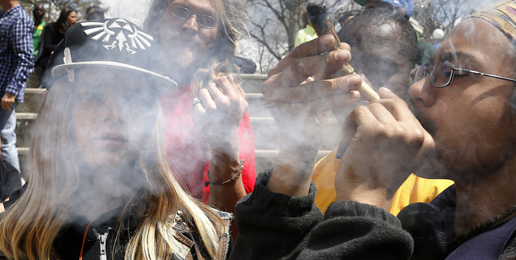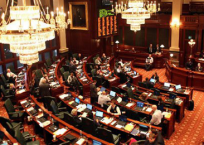
State Senator Heather Steans (D-Chicago) and State Representative Kelly Cassidy (D-Chicago) have spent 2 years developing and promoting their proposal to legalize “recreational” marijuana in Illinois. On May 7th, their 533-page bill (SB 7) was introduced in the Illinois Senate.
Last week the Senate Executive Committee held a 2.5 hour subject matter hearing on this bill, and it was alarming to hear how many concerns and questions they were unable to lay to rest.
Michele Ratini, a social worker from a Leyden High school District 212 in Northlake, testified in opposition to legalization, pointing out that teenagers are not smoking cigarettes anymore, but are instead smoking and vaping tobacco and marijuana. She said she is seeing an increased number of students exhibiting paranoia and psychosis.
Dr. Albert Mensah, who runs the Mensah Medical Center, corroborated her statements. But Illinois State Senator Toi Hutchinson (D-Chicago Heights), a strong proponent of legalization, thinks that that is the very reason we should legalize, tax and regulate it.
If students are easily getting the high potency stuff now, how much easier will it be for them to get it once it’s legalized?
To give you a reference point to digest the following information, keep in mind that the Woodstock marijuana of the 1960s and 1970s contained 1-3 mg. of THC (what gets you high). And people back then got plenty high. Today’s marijuana contains 20-25 mg. of THC.
A question was raised in the committee hearing: Will expungements of felony convictions for marijuana allow for someone filling out a Firearm Owners Identification (FOID) or Conceal Carry form to indicate “No” on whether they have ever been convicted of a felony? (Keep in mind that the vast majority of inmates in prison for possession charges have plea-bargained down from more serious felony crimes.) Illinois Deputy Governor Christian Mitchell, who was representing the governor’s office, answered “Yes.” In other words, convicted felons, whose more serious crime charges were significantly reduced, will have their records automatically expunged.
Also, once you read what the bill will allow, keep in mind that today’s high potency marijuana is directly linked to an increase in mental illness such as psychosis, schizophrenia and violent behavior.
The bill is huge, but here’s a small picture of what SB 7 will do:
- Allow possession of 30 grams of cannabis by anyone 21 and older. By the way, thirty grams is equivalent to 75 joints.
- Allow marijuana-infused edibles containing 500 mg of THC. Colorado limits the THC in edibles to 100 mg.
- Allow possession of 5 grams of concentrates which contain upwards of 99 percent pure THC.
- Allow homes to grow up to 5 plants. One plant can yield ½ lb (226 grams) and can be harvested 4 times per year. Five plants times 4 harvests would yield 10 lbs. or over 11,000 joints. There is absolutely no way to regulate this, per law enforcement who testified. This is why Colorado’s black market is surging.
- Provides $20 million in low-interest loans for “social equity applicants” who have been “disproportionately impacted” by discriminatory drug policies. These are your recently convicted felons. Based on their point system, if you have been convicted of any offense eligible for expungement, you automatically have 25 points.
- Provides a waiver of 50 percent of startup costs for “social equity applicants” who have been “disproportionately impacted” by discriminatory drug policies.
- Identifies disproportionately impacted areas (i.e., minority communities) for dispensary locations.
- Institutes a cannabis purchaser tax (note: it’s the regulations and taxation that cause the black market to thrive by selling it cheaper):
10 percent on cannabis with a THC level at or below 35 percent
20 percent on cannabis infused products
25 percent on cannabis with THC level above 35 percent
3 percent Municipal Purchaser Tax
0.24 percent County Tax
3.5 percent Unincorporated Area Tax
- No marijuana dispensaries or advertising within 1,500 ft of a school, playground, hospital, park, childcare center. (That’s only about 1 ½ blocks, but they could keep it a mile away and kids and teens would still be exposed.)
- Allocation of revenue:
35 percent General Revenue Fund
25 percent Restoring Our Communities Fund (Apparently, once you flood the “disproportionately impacted” communities with more drugs, you throw some money their way. But I digress.)
20 percent Mental Health and Substance Abuse Services
10 percent Budget Stabilization Fund (There’s an oxymoron if I ever saw one.)
8 percent Illinois Law Enforcement Training and Standards Board
2 percent Drug Treatment Fund for public education and awareness
- Local Ordinances – Municipalities may enact reasonable zoning restrictions pertaining to licensed cultivation centers, craft growers, processing organizations, and dispensaries. (The definition of “reasonable” has not been defined, according to last week’s hearing.)
Major Omission
There are no limits to THC levels in what SB 7 will allow. The Dutch government has walked back their liberal drug policies because of the problems they have encountered with high levels of THC. They now consider 15 percent or higher as a hard drug, alongside opioids and ecstasy. That should tell us how serious and dangerous it is to legalize high potency marijuana as “recreational.”
SB 7, as you can see from the proposed taxation schedule, has no limits. High THC levels are linked to an increase in mental illness, especially psychosis and schizophrenia, as well as being responsible for the increase in hospitalizations and ER visits. SB 7 also allows for concentrates, or extracts, which are sticky substances produced via distillation and containing upward of 99 percent THC.
Take ACTION: Please click HERE to send a message to your state senator and state representative to urge them to reject the push for legal marijuana.
Additionally, PLEASE CALL your lawmakers to make sure they know that many people oppose this disastrous policy. Click HERE for their names and phone numbers, which you will find at the end of the state list. Please make the calls!
Watch more:
Please visit IFI YouTube channel and this video playlist dedicated to the opposition of marijuana legalization.
Read more:
Thinking Biblically About Recreational Marijuana
Medical Doctor from Peoria Opposes Legal Pot
ER Doc Says “Recreational” Pot Has Ruined My Town
IFI Resource Page on Marijuana
Former State Rep. Jeanne Ives Address Marijuana & Illinois’ Economic Crisis (podcast)
More info:
A bold voice for pro-family values in Illinois!
Click HERE to learn about supporting IFI on a monthly basis.


































